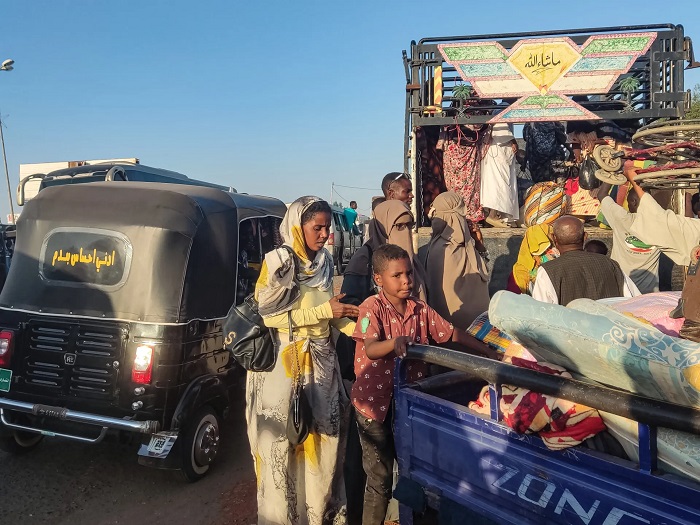Thousands flee as conflict engulfs Sudan’s second-largest city
Numerous individuals displaced from the once secure city of Wad Madani in Sudan are seeking refuge elsewhere as the conflict between the army and the paramilitary Rapid Support Forces (RSF) escalates and reaches the city. According to reports from the AFP news agency, paramilitary forces have established a base in the eastern part of Sudan’s second-largest city, compelling thousands of already displaced individuals to flee.
The RSF’s assault has created a new battleground in the ongoing eight-month-long war, penetrating what was previously considered “one of Sudan’s few remaining sanctuaries,” as stated by William Carter, the Sudan director of the Norwegian Refugee Council (NRC).
Videos shared on social media depict crowds of people, many of whom had sought safety in Wad Madani from the violence in the capital Khartoum, hastily packing their belongings and leaving the city on foot.
In a phone interview with Reuters, 45-year-old Ahmed Salih shared his plight, stating, “The war has reached Madani, so I am in search of a bus to flee with my family.”
He expressed the dire situation, describing their living conditions as hellish and lamenting the absence of assistance. Salih mentioned his plan to head south to Sennar in an attempt to escape the turmoil.
In response, the RSF employed artillery, and witnesses noted the movement of RSF reinforcements toward the conflict zone. Additionally, RSF soldiers were sighted in villages to the north and west of Wad Madani in the preceding days and weeks, according to residents.
The genesis of the conflict in Sudan traces back to heightened tensions between army chief General Abdel Fattah al-Burhan and RSF commander General Mohammed Hamdan Dagalo, which erupted into open hostilities in mid-April.
The war erupted due to disagreements regarding plans for a political transition and the integration of the RSF into the army, occurring four years after the ousting of former ruler Omar al-Bashir in an uprising.
According to a conservative estimate from the Armed Conflict and Event Data Project, over 12,000 individuals have lost their lives in the conflict, and nearly 6.8 million have been compelled to abandon their residences, as reported by the United Nations.
As of Sunday, the UN disclosed that 14,000 people have fled Wad Madani, with a few thousand having already arrived in other cities.
A significant portion of the half-million individuals seeking refuge in al-Jazirah originated from Khartoum. Wad Madani alone shelters more than 86,000 displaced individuals, leading the UN to suspend all humanitarian field missions in al-Jazirah state.
The UN further highlighted that over 270,000 of the city’s 700,000 residents relied on humanitarian aid.
United States Ambassador John Godfrey issued an appeal to the RSF, urging them to halt their advance on al-Jazirah state. In a statement on Sunday, Godfrey expressed concerns that the continued RSF advance posed a risk of substantial civilian casualties and could significantly disrupt humanitarian assistance efforts.
“No place for shelter from the violence”
On Sunday, families were in a frantic scramble to seek safety once again, only to discover that bus tickets had surged to $60 per person, quadrupling in cost, and many found themselves with no viable refuge.
The NRC’s William Carter expressed concern about the continuous influx of people, including those who had recently fled for their lives, now converging on neighboring states’ already strained and resource-depleted cities.
Carter emphasized the plight of highly vulnerable families in Wad Madani, packed into displacement sites in schools for months, lacking a place to hide from violence, means to escape, and alternative destinations to flee to.
Describing the situation as “catastrophic,” Sudan’s doctors’ union stated on Sunday that pharmacies in the city had been forcibly closed.
Meanwhile, doubts were cast by the army and RSF on an East African mediation initiative proposed last week, aimed at bringing an end to a conflict that has resulted in the world’s largest internal displacement and raised alarms about famine-like conditions.
In both Khartoum and the cities within Darfur that have been occupied by the RSF, residents have recounted incidents of rape, looting, as well as arbitrary killing and detention. Additionally, the RSF is facing allegations of engaging in ethnic killings in West Darfur.
Despite these serious accusations, the RSF has consistently denied any wrongdoing, asserting that individuals within its forces implicated in such crimes will be subject to accountability.
